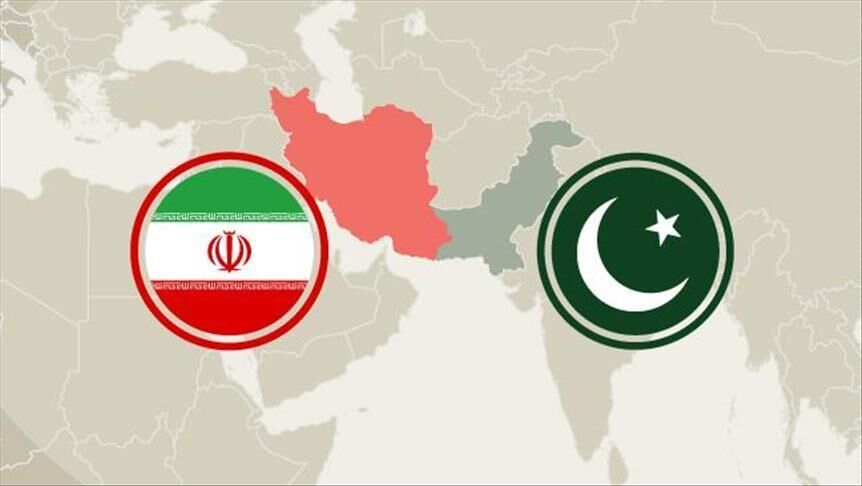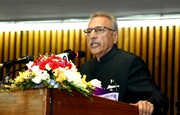Close interaction and cooperation with neighbors is the main strategy of Iran, especially the roadmap of the 13th government, which was emphasized by President Ayatollah Raisi in his recent meeting with high-ranking officials of the eastern neighbor, Pakistan.
Pakistan, as an Islamic country and a close neighbor of Iran with a common border of nearly one thousand kilometers, has a special place in Iran’s foreign policy to strengthen political, diplomatic, economic, military, and security relations.
**The Thirteenth Government's vision for finding new ways to interact with its eastern neighbor
President of Iran Seyed Ebrahim Raisi, during an important meeting with the Chairman of Pakistani Senate Mohammad Sadiq Sanjrani, said that the relations between Tehran and Islamabad are beyond the neighborly relationship.
Raisi said that the desired level of relations between Iran and Pakistan is much higher than the current level, noting that new ways can be created to deepen relations between the two countries.
In this regard, President Raisi met with the Prime Minister of Pakistan Imran Khan on the sidelines of the SCO Summit in the Tajik capital last month, stating that there are intact and valuable capacities in the two countries to expand relations.
He said Iran promotes regional relations and cooperation, especially with neighboring countries, and Pakistan has a special place among them.
**Iran and Pakistan; two complementary economies
The resumption of banking channels has always been a major demand of Pakistani traders interested to develop economic linkages with the Islamic Republic of Iran.
There were some efforts in past to resume the banking ties between the two important neighboring states however this could not be materialized due to reluctance of the Pakistani banking sector amid unjustified and illegal economic sanctions on Iran.
Pakistani traders and industrialists are very much interested to explore the big Iranian market and for this, they have also suggested the Pakistani government start a barter trade system with Iran to bypass economic sanctions.
In a recent development, Iran and Pakistan have reopened Zero Point Gate at Taftan border crossing after a six-month closure to facilitate duty-free trade between border residents of the two neighboring countries.
Ambassador of Iran to Pakistan Seyed Mohammad Ali Hosseini expressing his views at National Defense University said the economies of Pakistan and Iran are inherently complementary, and these two factors have great potential for the development of economic and trade cooperation between the two countries.
He said Pakistan, has a developing economy with an increasing need for energy resources, and Iran is one of the richest countries in the world in terms of energy resources.
Also, Pakistan can meet some of Iran's needs, especially in the agricultural sector, and Iran has the capacity to be able to cover a significant percentage of Pakistan's needs for various goods and services. Iran is ready to meet Pakistan's energy needs (including oil and oil products, gas, electricity).
** Tehran-Islamabad regional cooperation
Facilitating transit trade and the operation of communication projects in the region, such as the ECO freight train, is one of the potential capacities of Iran and Pakistan to develop regional cooperation.
Iran's acceptance of the Pakistan-China joint economic corridor project called CPEC and the positive attitude of Pakistanis towards the comprehensive 25-year cooperation program between Iran and China will also pave the way for cooperation between the two neighboring countries for regional interactions.
Iran's accession to the China-Pakistan Economic Corridor has many benefits for this macroeconomic project. First of all, it fills the current gap in relations between the two countries. Iran's inclusion in the project will entail socio-economic and cultural entanglement and, consequently, strengthen ties between the three countries of Iran, Pakistan, and China.
In recent weeks, there has been good news about the revitalization of the Istanbul-Tehran-Islamabad-Rail Corridor project, and it has been announced that Pakistan's largest logistics company (NLC) is seeking to import valuable cargo from Istanbul to Islamabad via Iran. The latest important step is to take advantage of the trade corridor between Tehran, Istanbul, and Islamabad.
Meanwhile Federation of Pakistan Chambers of Commerce and Industry (FPCCI) has welcomed the revival of the Istanbul-Tehran-Islamabad (ITI) road corridor.
The Iranian ambassador while interacting with the Islamabad Chamber of Commerce and Industry has said I barter trade system is an effective mechanism to counter sanctions and boosting trade between Iran and Pakistan.
It is worth mentioning that during the visit of the Pakistani Foreign Minister to Tehran in April this year, the Foreign Ministers of Iran and Pakistan signed a memorandum of understanding to establish joint border markets with the aim of strengthening cross-border economic exchanges.
**Increasing official borders promising easy trade between Iran and Pakistan
Last year, the two brotherly and neighboring countries witnessed a dramatic change in the development of border cooperation, during which two new official border crossings between Iran and Pakistan were opened.
The second and third official crossings of Iran and Pakistan were also officially opened in Rimdan (Gabd) and Pishin (Mand) in December last year and April this year, respectively with the presence of Iran's Minister of Roads and Urban Development Mohammad Eslami, and Pakistan’s Minister of Defense production Zobaida Jalal and other officials.
Pakistan businessmen have also called for practical measures to effectively promote bilateral trade; utilizing various functional channels between the two countries for mutually beneficial long-term business relations.
Iranian companies have also participated in Pakistani expos drawing the attention of Pakistan traders while many Pakistani companies have also displayed their products in Iranian business exhibitions.
Way back in 2017 the State Bank of Pakistan (SBP) had signed a Banking and Payment Arrangement (BPA) with Iran’s central bank, Bank Markazi Jomhouri Islami Iran (BMJII).
The agreement was supposed to be used for payment of trade conducted via a letter of credit in accordance with international law and regulations.
Rice exporters and traders in Pakistan have also proposed the government establish a strong banking system with the Islamic Republic of Iran or implement a Special Purpose Vehicle (SPV) system to boost trade, especially the rice exports.
Pakistan has a very high capacity to increase the quantity and quality of trade relations with the Islamic Republic of Iran, and estimates show that by creating the necessary infrastructure, trade between the two countries can increase up to billions of dollars a year. Pakistan and Iran also have a high potential for joint ventures.
272**2050
Follow us on Twitter @IrnaEnglish








Your Comment